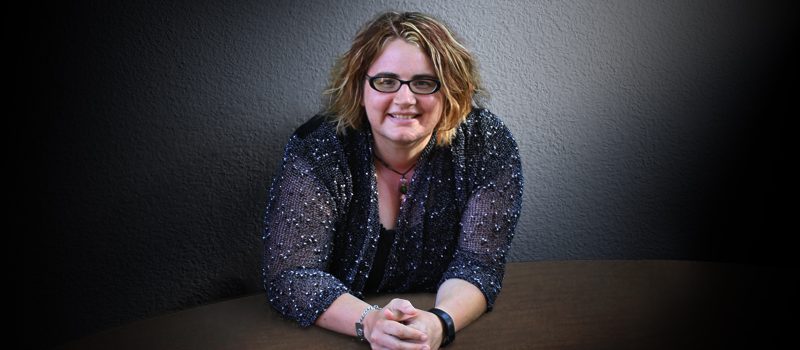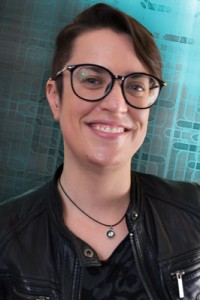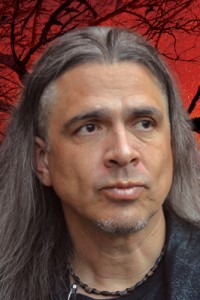Kameron Hurley: Of Men and Monsters
 I got fall-down drunk a week or so ago; literally falling on the stairs and knocking down a piece of art, and the next day, I had a panic attack so severe I had to take a break from work and have a lie down.
I got fall-down drunk a week or so ago; literally falling on the stairs and knocking down a piece of art, and the next day, I had a panic attack so severe I had to take a break from work and have a lie down.
Clearly, I have been processing a lot of emotions – or not processing, which is why my body decided to express how I felt after over 100 days of lockdown; ongoing protests against police violence – punctuated by extreme police violence, of course; and continuing stories about even more of my peers in science fiction and comics leveraging their positions in the community to grope, harass, and abuse their peers.
It was just too damn much.
Monsters masked as men have always walked among us. Thieves and bullies, manipulators and harassers. What ensures their continued existence is the esteem we hold them in, the lifting up of powerful bullies out of fear: fear of retribution, fear of discomfort, fear of what would happen if we did not uphold the status quo. Assholes, jerks, and even monsters can be witty and funny and attractive and charming. That’s how they embed themselves in our communities and institutions.
I am writing this column well in advance of when you’ll actually see it, which poses some challenges. I could discuss issues related to writing fiction, or address the ongoing massive protests against militarized police, or dive into the thorny mess that is the dozens of writers in the science fiction and comics worlds who have been revealed (many of them, for the second, or third, or whatever number of times) as serial harassers and general assholes who have made our genre unwelcoming to new authors.
I initially assumed only one of these would be an evergreen subject, but the wheel of time turns, and after 40 years in this country and 20 years in this industry, I find that we end up having the same conversations – often, about and involving the same people! – and see the same massive movements and cries for change over and over again.
The reason these issues return is because we punish individuals instead of remaking systems. A murderous police officer shuffled off to another department here, a serial groper losing an agent there. To make real, structural, social change would mean creating a culture that does not promote, excuse, or celebrate this kind of behavior. As long as we hold up narcissistic, sadistic bullies as heroes and icons, we will continue to find our communities and institutions beset by the same conversations, the same mass movements, the same crimes committed and grievances aired, repeated over and over again.
That means that when I consider what future you may be reading this from, two months from this moment I am writing in, I don’t look ahead for answers…. I look to the past.
Surely, in your future, tens of thousands more Americans will be dead from COVID-19. Whole swaths of the country are likely back in lockdown. Maybe we’re bombing some other country, as a distraction for what a shitty government we have, or perhaps bombing our own people. Protests continue. Structural changes are small, limited to cities and counties and individuals.
In the science fiction world, maybe a few more writers have lost a few more agents and been dumped by a few more publishers. But hey, you know – there’s always some publisher willing to pick up just about anyone.
Many of us find ourselves wholly unprepared for nurturing change during a slow apocalypse. We always anticipated something sudden, like a nuclear attack or a meteor or an alien invasion, which would force us to come together and transform how we lived. There’s no script on how to live on, live in, live through the dissolution of the world as you know it, as infrastructure collapses, epidemics sweep through unchecked, living wages fall, people are murdered in the street by militarized police while tanks roll in, and safety nets vanish. Everything seems to be horrible.
The thing is, all of these horrible things have always existed. The trouble is, they never went away.
Whenever I talk about the present, my mother reminds me of the 1960s; the civil rights movement, the protests against Vietnam, armed cultists poisoning salad bars, and all manner of screaming injustice and unrest that ushered in a new world, a new normal.
However, I would argue there was no truly new world ushered in, after that. A marginally improved one in some ways, maybe, but let’s remember that everyone went on to vote for Regan – twice – and doubled down on the status quo. In 1985, the city of Philadelphia dropped a bomb on its own citizens, killing 11 and leaving 250 homeless.
There have always been times like these.
What we are seeing now is a continuation of a very long history of genocide, murder, injustice, human servitude, and unabashed, unregulated rule by robber barons and assholes that has defined this country and many of our communities from the very start. We have never reconciled with that past, and until we do, that rot at our core will continue to infect and damage us; we will never be the American we hope to be, if we don’t admit the America we are.
We can never become an inclusive community until we acknowledge where we’ve come from, and the history of the country we live in.
This reckoning has yet to fully come to science fiction circles. How do we go forward creating professional spaces without acknowledging that it’s many of the luminaries in our fields who groped and grabbed and harassed hundreds – if not thousands – of aspiring writers out of the field in the last 70 years? When you create a society, or a community, that rewards bad behavior, you make a safe space for the very worst of us. When you don’t acknowledge that problems are systematic more than individual, you’ll waste your time focusing on punishing a single bad actor instead of burning down the entire scaffolding that enabled their behavior.
How many of us have excused a behavior – even a violent one – because it was from someone we liked, someone who held perceived power, someone we wanted so badly to be good that we ignored the bad?
Casting ahead to you, two months in my future, I wonder: what have you seen that I have yet to experience that has changed your view of yourself, your choices, your assumptions, your expectations, the systems that surround you, in the last two months? What have you lost, or gained? And are you keeping track? Are you more or less human than you were two months ago? More or less reckless? Do you ask more or fewer questions?
While the world undergoes another cycle of necessary upheaval, it has become increasingly certain that I am likely to be spending the next couple of summers just as I have been spending this one: within the same few blocks of my house, gardening, doing dishes, writing books, tearing my hair out over finances, being careful and critical of the news, and trying to be kind to myself in an effort to prolong my own life.
Because living in a slow apocalypse can get to you, with the knowledge that nothing is certain except uncertainty as the world is remade. For all my restlessness, though, I have hope. America’s anger, our community’s anger, gives me hope.
We aren’t dead yet. Not quite yet.
It’s been difficult for me to write anything these days that isn’t prefaced with how difficult it is to do much of anything but survive during the final death throes of America as we know it. I attribute my current chipper attitude to being wholly sober since my fall on the stairs, for the first prolonged period since lockdown began in March.
I burned and burned through all my anger and remorse, in passionately unhealthy ways, and all that’s left, when you burn all that away – is hope.
Sometimes you have to burn and burn and burn because it’s the only way to get rid of the monsters, the only way to make space for something new to germinate in the space they once occupied.
Kameron Hurley is the author of The Stars are Legion and the award-winning essay collection The Geek Feminist Revolution, as well as the God’s War Trilogy and The Worldbreaker Saga. Hurley has won the Hugo Award, Kitschy Award, Locus Award, BFA Award, and Sydney J. Bounds Award for Best Newcomer. She was also a finalist for the Arthur C. Clarke Award, the Nebula Award, and the Gemmell Morningstar Award. Her short fiction has appeared in Popular Science Magazine, Lightspeed Magazine, and many anthologies. Hurley has also written for The Atlantic, Bitch Magazine, The Village Voice, and Entertainment Weekly. She posts regularly at KameronHurley.com.
All opinions expressed by commentators are solely their own and do not reflect the opinions of Locus.
This article and more like it in the August 2020 issue of Locus.
 While you are here, please take a moment to support Locus with a one-time or recurring donation. We rely on reader donations to keep the magazine and site going, and would like to keep the site paywall free, but WE NEED YOUR FINANCIAL SUPPORT to continue quality coverage of the science fiction and fantasy field.
While you are here, please take a moment to support Locus with a one-time or recurring donation. We rely on reader donations to keep the magazine and site going, and would like to keep the site paywall free, but WE NEED YOUR FINANCIAL SUPPORT to continue quality coverage of the science fiction and fantasy field.








